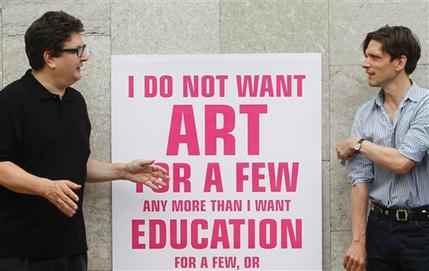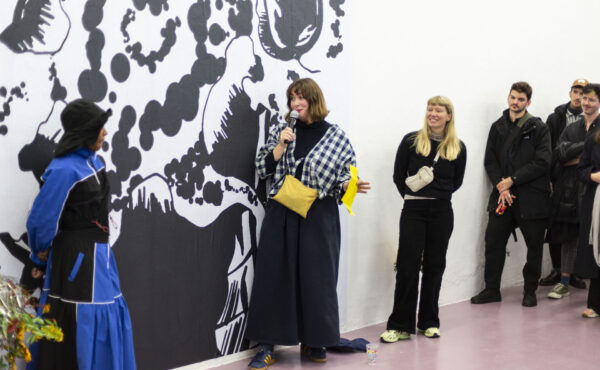
How to short circuit culture

A report on the serious cuts in funding for the arts in the UK.
One isn’t part of the arts for the earnings, a common statement that now finds another legitimation. As in most countries, the earning of artists and art professionals in the UK isn’t up to standards to other industries. And now a new threat is made to this working conditions with major cuts announced by the government.
With the coming of the new United Kingdom Coalition government formed by the conservative party led by David Cameron together with the Liberal democrats led by Nick Leg in May 2010 the tone for cuts was set. In their statement as a response to the ongoing financial crisis they agreed on introducing widespread reform and budgetary cuts in public spending. Where these cuts and reforms are to be introduced was first announced in June 2010 with a focus on merging and abolishing or withdrawing funds from 54 quango’s or NDPB’s (which are quasi autonomous organisations funded by the national government – Non-Departmental Public Bodies). In October 2010 192 quango’s where set to be abolished of which 118 to be merged. Cultural organisations that were announced to shut down within the department for Culture, Media and sport are the UK Film Council, Museums, Libraries and Archives Council, The Theatres Trust and Design Council (The last two might become a charity). And although most of the quango’s active within the arts are left untouched on grounds of performing technical functions that are ought to remain independent from the government, budgetary cuts further threaten their well functioning.
As in most countries, the earning of artists and art professionals in the UK isn’t up to standards to other industries.
The government set an overall cut of 25 percent of the budget for the department for Culture, Media and Sport. With an annual budget of 2bn pounds they will have to meet 500m pounds saving which comes mainly from the media and Culture part of the department. The Arts Council that is the main public funding body within the UK will have to cut 29.6 percent of their current budget by 2015. Earlier this year it already had to cut 15 percent of their administration and running costs (a 6.6 percent of their overall budget) and will have to cut another 50 percent (from 22m to 11m pounds). Whether the organisation in its upcoming format will be able to distribute the money for the arts properly is still to be seen.
Last week the Arts Council announced how they will proceed in cutting 29.6 percent of the budget. The cuts will happen in a four years step programme with in the first year a cut of 6.9 percent for most of the arts organisations. This first year is considered as transitional whereas secondary art related initiatives were hit first (organisations active in Creativity, Culture and Education, Art and Business and Strategic Opportunities for Artistic Work). In 2012 all organisations will be asked to apply for funding and this is the moment announced where some organisations will see there funding disappear. As stated by the Arts Council “Some organisations might not receive funding in the future, some more and some less. The Secretary of State asked to ensure not to cut the arts organisations with more then 15 percent whereas this is the tipping point for the organisations to go out of business”. They also asked to keep the free entrance policy for the main institutions. The Arts Council though isn’t sure if it will succeed in meeting these aims. Other questions that remain at this point are: what is to happen to the many organisations that aren’t structurally funded and to project funding for artists? Many arts organisations in the UK run on project funding and are already underfinanced.
The idea that you can cut a £180bn deficit by slicing money out of the budget of the Department of Culture, Media and Sport is frankly absurd.
In an article published in the Guardian just before the official announcement by the government on the 20th of October, Nick Serota, director of Tate stated his concerns and claimed that the cuts might form the end of a developing culture. He opened his article with a statement by Nick Legg previous to the elections: "The idea that you can cut a £180bn deficit by slicing money out of the budget of the Department of Culture, Media and Sport is frankly absurd." Though now in Nick Serota’s latest statement for the BBC he seemed to be relieved that the cuts are not as deep as was threatened though keeps cautious to see what will happen to the local funds. Perhaps his relieve stems from the relatively spared position of the major institutions but the cuts still imply a drastically changing landscape. With major institutions on occasion acting as project spaces, partly because it is cheaper but also due to the changing role of museums, smaller art organisations are once more under attack. In a recent article published in the Guardian ‘Will philanthropists save the arts‘, a mixed report on the ability of private funding to meet up the deficiency of public money, Charlotte Higgins points out that often only the major institutions have the resources to tap from these budgets and thus also this won’t offer salvation for the delicate ecosystem of the arts.
An earlier attempt to save this ecosystem was set up by a group of artists via a blog that hosted a petition called save the arts. The petition was signed by thousands of people as an attempt to prevent the announced cuts to become actual. In their outline they state that “The arts are a major employer, and they generate far more revenue than they cost to fund. In addition they are a major attraction for tourism in the UK. While cutting arts funding may save money in the short term, in the long run it risks undermining what has been one of the country’s most vibrant areas of growth over the past fifteen years.” There hasn’t been any reaction on the blog so far on the latest news released on the 26th of October but hopefully the scene will not give to respond.
Pieternel Vermoortel


